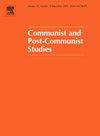反对普京和腐败,支持纳瓦尔尼和“革命”?
IF 1.3
4区 社会学
Q3 INTERNATIONAL RELATIONS
引用次数: 3
摘要
本文旨在更好地理解2017-18年大规模政治运动导致俄罗斯出现的全国性抗议活动的动态。在此期间由不同的反体制反对派领导人和组织组织的六次抗议活动的原始数据库的基础上,本研究探讨了这些事件的投票率和地理范围,以及用于动员抗议者的框架的全部内容。分析对比了三种类型的框架(反腐败抗议框架、竞选活动框架和反体制抗议框架),并证明适当的框架是成功动员抗议的必要条件。再加上其他因素,如抗议组织的质量和当局镇压行动的影响,抗议框架的变化促成了抗议人数的动态变化。最受欢迎的反体制领导人阿列克谢·纳瓦尔尼(Alexei Navalny)成功地组织了最初的动员,将其定义为一场反腐败抗议,但随后,在日益加剧的镇压下,反对派未能将这种异议转化为一场具有更广泛选举或反体制框架的长期运动。本文章由计算机程序翻译,如有差异,请以英文原文为准。
Against Putin and Corruption, for Navalny and the “Revolution”?
This article seeks to provide a better understanding of the dynamics of the nationwide protests that appeared in Russia as a result of the large-scale political campaigns of 2017–18. On the basis of an original database devoted to six protests, organized in this period by different anti-systemic opposition leaders and organizations, the study explores the turnout and geographic scope of these events and the repertoire of frames that were used to mobilize the protesters. The analysis contrasts three types of frames (an anti-corruption protest frame, election campaign event frame, and anti-systemic protest frame) and demonstrates that appropriate framing was a necessary condition of successful protest mobilization. In combination with other factors, such as the quality of protest organization and the impact of repressive actions of the authorities, the changes of protest frames contributed to the protests’ turnout dynamics. Alexei Navalny, the most popular anti-systemic leader, succeeded in organizing the initial mobilization by framing it as an anti-corruption protest, but then, under increasing repression, the opposition failed to convert this dissent into a longer-term campaign with broader electoral or anti-systemic frames.
求助全文
通过发布文献求助,成功后即可免费获取论文全文。
去求助
来源期刊

Communist and Post-Communist Studies
Multiple-
CiteScore
1.90
自引率
0.00%
发文量
23
期刊介绍:
Communist and Post-Communist Studies is an international journal covering all communist and post-communist states and communist movements, including both their domestic policies and their international relations. It is focused on the analysis of historical as well as current developments in the communist and post-communist world, including ideology, economy and society. It also aims to provide comparative foci on a given subject by inviting comments of a comparative character from scholars specializing in the same subject matter but in different countries.
 求助内容:
求助内容: 应助结果提醒方式:
应助结果提醒方式:


